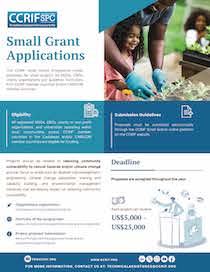September 23, 2009 – Students studying risk management and natural hazards-related subjects will soon benefit from scholarships to be offered by the Caribbean Catastrophe Risk Insurance Facility (CCRIF). This was recently announced by CCRIF’s Chairman Milo Pearson following the latest CCRIF Board Meeting in Jamaica. Pearson said that it was a move to give more help to member states to build their capacity to better deal with the physical and socio-economic impacts of natural catastrophes, particularly in the face of growing risks due to climate change.
The scholarships are part of a new technical assistance programme to be offered by CCRIF. The overall aim of the programme is to help Caribbean countries deepen their understanding of natural hazards and the potential impacts of climate change on the region and to develop adaptation strategies and build regional climate change resilience through improved risk management.
The technical assistance programme is to consist of three main components: the scholarship programme; regional capacity building through project funding in the areas of natural hazards and climate change in partnership with regional institutions; and support for local disaster management and climate change adaptation initiatives and capacity building of NGOs and other charitable organisations.
The scholarship programme, the details of which are expected to be announced in December, will support studies at the University of the West Indies (UWI) as well as elsewhere, and will focus on enhancing regional capacity through funding of around five students in selected bachelors and masters programmes.
One area in which project funding from CCRIF is likely to be available is for the establishment and training of Country Risk Officers who would be responsible for managing their country’s risk profile and enabling the adoption of a holistic approach to risk management before catastrophic events occur thereby reducing the country’s risk burden and its vulnerability. Pearson stated that “CCRIF, in collaboration with key regional and international partners, aims to support the development of the necessary skill set to enable the position of Country Risk Officer to be filled and operational in each member state.”
Recognising that better data will result in better decision-making and planning by regional governments, CCRIF aims to fund a programme to facilitate more comprehensive collection of extreme hydro-meteorological and geophysical data in member countries. This will also enable CCRIF to develop and implement parametric insurance policies at the local level. Again, CCRIF will work with regional institutions such as the Caribbean Institute for Meteorology and Hydrology and UWI’s Seismic Research Centre to build or enhance data collection networks with a particular focus on collecting data for extreme events.
A third area of potential funding is to support development of a better understanding of the national and regional economic consequences of climate change and potential tools to adapt to those consequences to minimise their impact on sustainable development.
The launch of the technical assistance programme by CCRIF is timely as countries focus on their national strategies for adaptation to climate change leading up to the Copenhagen United Nations Climate Change Conference in December.
About CCRIF: CCRIF is a risk pooling facility, owned, operated and registered in the Caribbean for Caribbean governments. It is designed to limit the financial impact of catastrophic hurricanes and earthquakes to Caribbean governments by quickly providing short term liquidity when a policy is triggered. It is the world’s first regional fund utilising parametric insurance, giving Caribbean governments the unique opportunity to purchase earthquake and hurricane catastrophe coverage with lowest-possible pricing. CCRIF represents a paradigm shift in the way governments treat risk, with Caribbean governments leading the way in pre-disaster planning.
Sixteen governments are members of the fund: Anguilla, Antigua & Barbuda, Bahamas, Barbados, Belize, Bermuda, Cayman Islands, Dominica, Grenada, Haiti, Jamaica, St. Kitts & Nevis, St. Lucia, St. Vincent & the Grenadines, Trinidad & Tobago and the Turks and Caicos Islands. Last year CCRIF paid out approximately US$6.3M to the Turks and Caicos Islands in the aftermath of Hurricane Ike.
For more information, see the CCRIF website at www.ccrif.org





